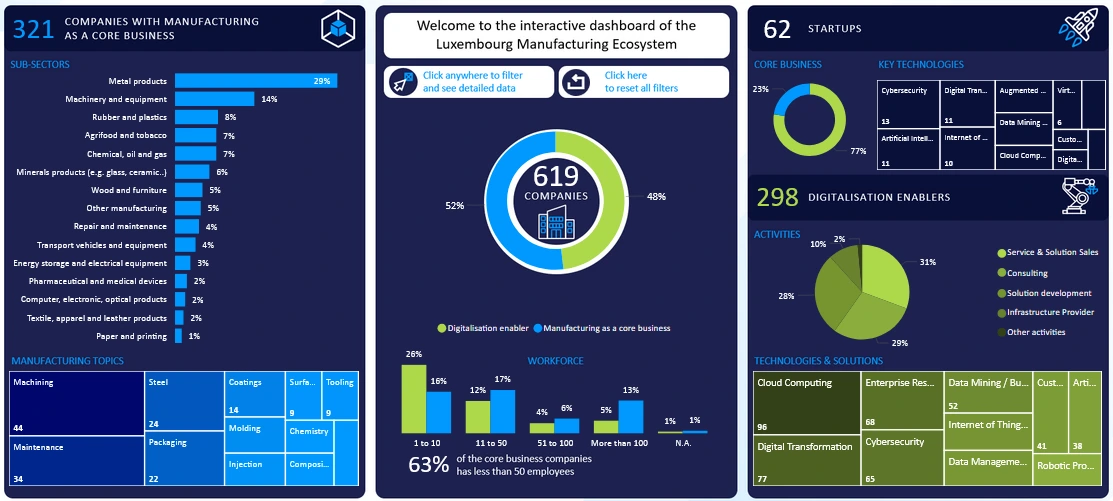Managing Director, Arnaud Fournier, emphasises how these analyses and other current initiatives are consistent with the company’s long-term strategy and commitment to innovation.
Established in 2003, the company specialises in the production of rotomoulded parts for a variety of purposes, including industrial, water and sewage treatment, agricultural, recreational, and other applications. With the creation of new digital tools, Mr Fournier sees an immense potential for industry 4.0 technologies to boost efficiency and productivity within the niche sector.
The advanced DMA enabled us to establish a digitalisation roadmap, which is currently being integrated into our strategic plan.
Arnaud Fournier, Managing Director
“Most rotational moulding machines in Europe today are between 20 and 30 years, so they were acquired at a time when interaction with machines were limited without the capacity to collect data and interact with the user. Today we have tools at our disposal that could quite easily be integrated into the rotational moulding process and have the possibility to bring man and machine closer together, which is what we want to do through our digitalisation activities,” he explains. The integration of these digital technologies also allows for a faster onboarding process for new operators and technicians in an industry that now depends significantly on the expertise and skills developed by more experienced operators over several years.
Digital maturity assessments
A critical step the company took in 2023 was to undergo the initial and then advanced digital maturity assessments (DMA) provided by the L-DIH, which is managed and hosted by Luxinnovation. “The initial DMA, a simplified digital assessment, provided an overall view of our digital maturity,” he underlines. The company then opted to undergo the advanced DMA, which as a second step is a more in-depth assessment that evaluates five key dimensions of a company’s digital DNA: strategy, value stream, organisation, tools and methods, and people.
“The advanced DMA enabled us to establish a digitalisation roadmap, which is currently being integrated into our strategic plan but could also be deployed more globally in the world of rotomoulding. It highlighted the availability of technological resources that are now considerably used in the industry, but above all, it specified the integration process for these new technologies through structured, step-by-step training for the employees who will eventually be responsible for managing these new tools,” he adds.
Six staff members people from Rotomade and its sister company Biorock took part in a workshop in March 2024 on new tools that will enable them to programme sensors quickly and efficiently. “The aim is to give them these skills, along with a means of creating data quickly for analysis,” he continues.
R&D projects: Innovating for sustainability
The future-oriented company did not just stop at digitalisation; it is actively involved in two research and development (R&D) projects. One project in close collaboration with the Luxembourg Institute of Science and Technology was approved for funding this year by the Luxembourg National Research Fund as part of its Bridges programme. The project aims to replace its current wastewater filtration media that consists of rock wool with a sustainable alternative, for example, a new media based on recycled low-density polyethylene.
Our objective here is to pull together the know-how we’ve been able to gather over the years.
The second project revolves around developing a new range of products for non-collective wastewater treatment. Leveraging their accumulated experience, the project aims to enhance their product design and purification performance. “Our objective here is to pull together the know-how we’ve been able to gather over the years to develop a new product range that is truly innovative, highly performant, and increasingly able to meet requirements in terms of purification performance, which have tended to increase sharply in recent years. This encompasses challenges related to suspended solids and nitrogen treatment, also known as denitrification.”
Luxinnovation’s continued support
Luxinnovation played a pivotal role in evaluating both R&D projects to ensure alignment with funding criteria. It also facilitated the company’s integration into a working group on water management in Luxembourg to encourage the formation of new collaborations and resource-sharing.
Innovation remains at the heart of our strategy.
“The team approached us on several occasions and explained that our company profile, business sector, policy, and the strategic plan we aim to implement make us a great fit for the group. They encouraged us to join the group based on the various exchanges we’ve had over the last few years. And that’s precisely what we appreciate about Luxinnovation, this ability to facilitate, put people in touch with each other, and develop the network. Individually, we don’t necessarily have a holistic view of all that’s going on in Luxembourg, so I think that Luxinnovation fulfils its role as a facilitator and accelerator in this way,” he says.
At the forefront of rotational moulding
Looking ahead, Rotomade aims to be a pioneer in rotational moulding and water treatment. Its goal is to be known not only for product quality, but also for environmental actions and pioneering initiatives to digitise rotational moulding processes. Mr Fournier also cites its ambition to manufacture 100% Luxembourg-made hydrogen tanks in the future.
“Innovation remains at the heart of our strategy,” he asserts. “What we want is to have ongoing research and development initiatives focused on developing solutions with significant added value, both for rotomoulding and water management. This includes exploring more sustainable materials, advanced manufacturing techniques and integrating digital technologies into different aspects of our operations,” he concludes.



 Abigail Okorodus
Abigail Okorodus